
On the 4.0 scale, an unweighted 4.0 GPA means perfection. You need straight As in every class—not even one A- is allowed. In college applications, this carries a lot of weight. You're essentially telling the college, "High school classes are a cinch. I've taken a tough course load, and I'm more than prepared for what college has to throw at me."
In high school, I got a 4.0 GPA with a course load featuring 10 AP courses. I got straight As and 12 A+'s. This strong course load, along with a strong application, got me into Harvard and every college I applied to.
While it's flattering to say, "Well, Allen's just a smart guy," in reality I relied a lot more on high-level strategy and effective academic habits. These were the same strategies I applied to my undergraduate work at Harvard and that led me to graduate summa cum laude with a 3.95 GPA. This is the guide I wish I had my freshman year of high school.
Do you know how to learn effectively? Do you plan your course sequence correctly? Do you know how to structure your time so you get an A in the most efficient way possible? Do you understand how your teacher thinks and how to give your teacher what she wants?
Do you have good study habits so you're not wasting hundreds of hours of study time? Do you have self-discipline and motivation to put in all the work required to handle a challenging course load? Do you know how to use your inevitable failures to adjust course quickly and improve yourself to raise your grade?
Going deeply into these topics is the subject of this guide. I believe these high-level skills are the critical foundation to academic success—without good strategy, you could pound your head against a wall and waste thousands of hours getting nowhere.
Tragically, these strategies are rarely taught in school. Teachers will collectively spend thousands of hours teaching you from their curricula but rarely will they show you how to strategize your coursework and get better grades.
This guide contains all the advice I wish I knew but had to figure out myself the hard way. If you earnestly apply most of the concepts here, I am certain that you will have a much higher chance of academic success.
What Is a 4.0 GPA?
In this guide, the 4.0 I'm talking about is a 4.0 unweighted GPA. A 4.0 means an A or A+ in every class, with no exceptions. An A- is a 3.7 on this scale, and a single one will knock you down from a perfect GPA. Typically an A+ doesn't count as a 4.3, so you can't go above a 4.0.
Here's my official high school transcript from 2005:
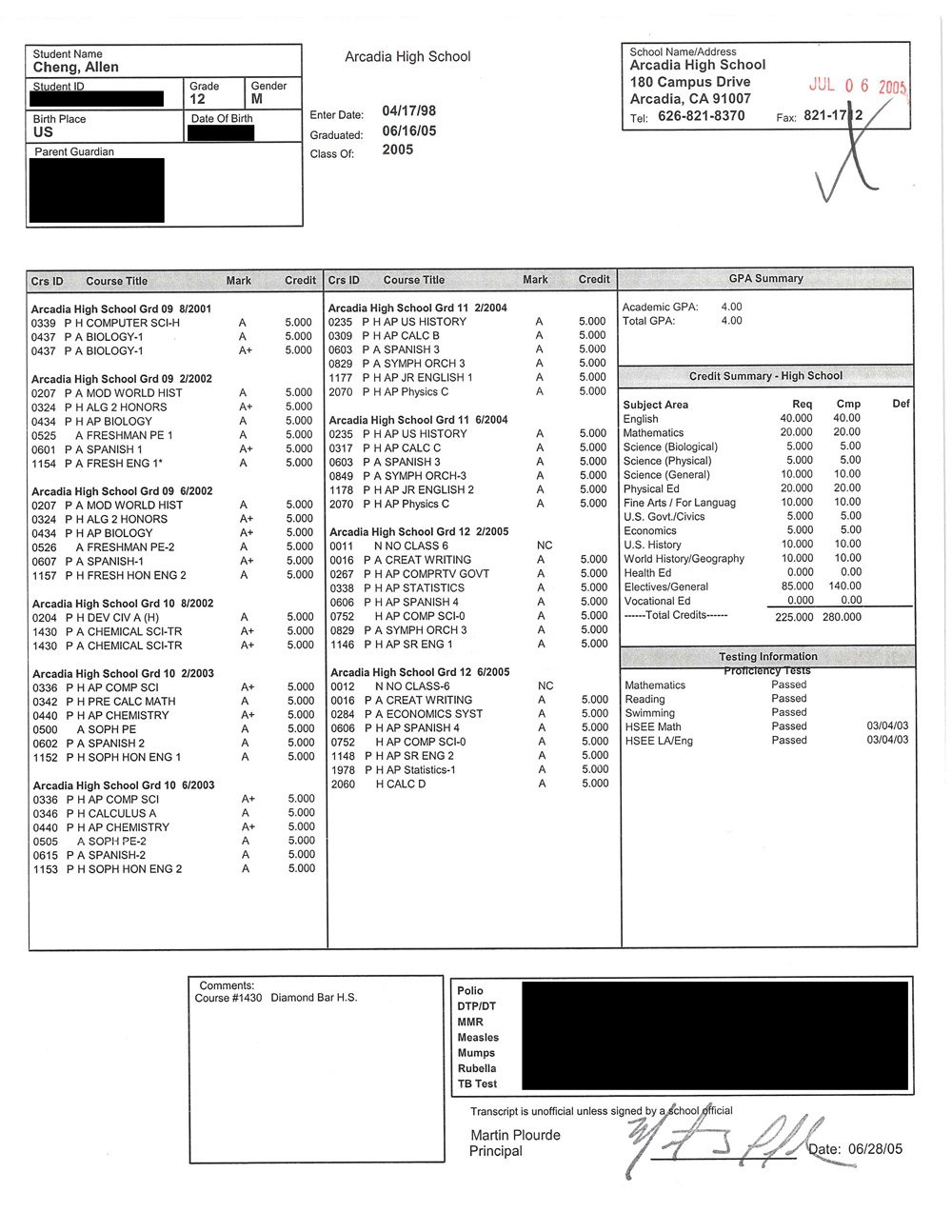
Here are a few things to glean from my transcript:
I took a pretty advanced course load, but it wasn't the most extreme course load possible. I took 10 AP classes in high school (I don't count my second AP Comp Science course since this was done for fun and I already knew the material).
This is a high number, but it's also not the max I could have taken, and I know some students take 12+ AP courses. I don't think this is necessary, since you'll do a lot better in college admissions if you spend the extra time exploring your interests and developing deep extracurriculars.
A's and A+'s are treated the same in GPA calculations. I started high school with a lot more A+'s in freshman and sophomore year, and ended with none junior and senior year. I don't think there's much to read into this other than the fact that junior/senior teachers didn't give out A+'s. (I have a story about that A+ in AP Biology below.)
Finally, here were my AP scores at the end of high school, taken from my Harvard student record:

In total, I took 14 AP tests and got 5s in all but two (Comparative Govt and Comp Sci AB, which doesn't exist anymore). These two also happened to be senior-year classes, meaning I was probably hit by senioritis.
I know a perfect 4.0 record like this might be intimidating if you feel you're not on track to replicating it. It shouldn't be. Again, a 4.0 isn't necessary for even top colleges like Harvard and Stanford. You can take half the number of these AP courses and still get into an Ivy League school. I know this because of my wide experience with students and from seeing a lot of resumes from Ivy League applicants when hiring for my company.
But I wanted a 4.0, so I worked for it, and I got it.
This ambition led to some stressful situations wherein I was deathly afraid of getting an A-, especially when the teacher's grading was incomprehensible. I know this can sound obsessive, and, as I'll mention below, I recommend most students avoid feeling this obsessive. But I'm just being honest and reporting my own experience for your benefit.
This guide contains every important strategy I used to maintain a perfect 4.0 GPA with a tough course load. I strongly suggest you read through this entire guide. At the very least, if you already have a solid foundation, you'll pick up some tips that might improve your coursework.
But I'm hoping that I'll dramatically change how you view your learning, how you're spending your time every day, and how you're playing the entire admissions game.
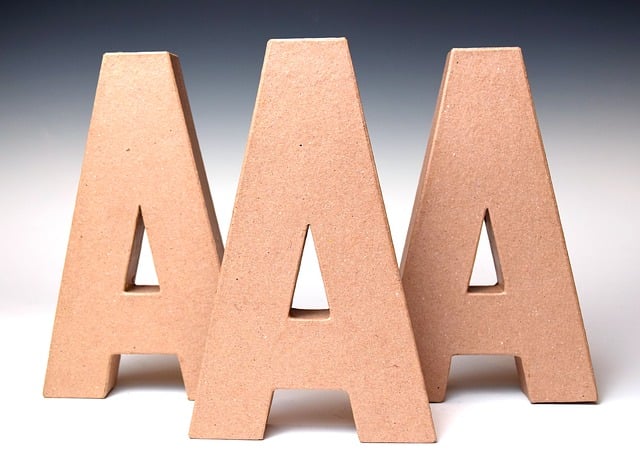 If you want a 4.0, your transcript will need to look like this.
If you want a 4.0, your transcript will need to look like this.
Important Disclaimers
Before we begin, I need to get a few things out of the way. Bear with me because I'm going to anticipate common objections you might have that can affect how you interpret my advice.
If you're looking for shortcuts or the academic equivalent of a "get rich quick" scheme, you won't find it here. I won't sugarcoat it—taking an advanced course load and getting great grades will take a lot of hard work. I don't know any legitimate secrets that are going to get you the same results while reducing your workload by 90%, and I'd be suspicious of anyone who promised such secrets.
But it is vital that you do the following:
- Develop the mindset and motivation to work hard
- Spend your limited time as effectively as possible to get the best results
That's what this guide is about.
I'm a very straightforward person, and I speak my mind. This means that some advice might rub you the wrong way. If that's the case, try to focus on the bigger picture and on the advice you do like. I don't want you to throw the baby out with the bathwater just because you think I'm a jerk. My focus is on helping you do better, and one of the best ways is to share my experiences honestly, warts and all.
I did indeed go through a lot of stress in high school and put in a ton of effort. I think I was obsessive about achievement and have a high capacity for mental pain, and I happen to love working hard. I don't think it's optimal for most students to do what I did and feel what I felt, and I'll explicitly point this out at places. So just because I describe my experience doesn't mean I always condone it for everyone.
If you're aiming for a 4.0 GPA, I'm guessing you also want to get into top schools in the country, so I'll orient this guide toward both goals. That said, I want to stress that a 4.0 is not required to get into top schools like Harvard and Princeton. You do not need perfect grades and test scores to get into the Ivy League. In fact, the average unweighted self-reported GPA of incoming students at Harvard is 3.95. Thus, a 4.0 is really not that different from a 3.9 from the eyes of the college.
Do not freak out if you have high college goals and don't already have a perfect GPA. It's nowhere near the end of the world. I explain more about why in my guide to getting into Harvard.
The 4.0 number is not all you should aim for—the rigor of your coursework makes a big difference (this is where the concept of the weighted GPA comes in). Ideally, you'll take difficult courses and excel in them. But if you have to make a tradeoff, I'd lean toward the more difficult courses; a letter grade of a B in an AP class is better than an A in a regular class.

Despite the title of this guide, the concepts are widely applicable to GPAs in all ranges. Even if you're not aiming strictly for a 4.0, applying the advice here will get you closer to a 3.8 GPA or a 3.0 GPA or wherever you're aiming. You can use all the strategies here to improve your grades and raise your GPA. This is geared toward high school students, but for readers currently in college, the concepts apply equally to you and often even more so since you don't have as much parental structure over your work.
This guide targets high-achieving students who want to aim for academic success and push themselves to be better. As weird as it sounds, this is not the stance everyone should take. Yes, I know how stressed out students are these days about getting into college. No, I don't think everyone should feel as though they need to get into Stanford. Everyone has different academic goals, and this guide isn't for everyone.
I don't think everyone should aim for the toughest course load and perfect grades. Not enough students and families make decisions for personal happiness and are in a state of constant stress, especially if they always feel as if they're not doing enough. This can have bad long-term consequences. (In fact, applying the advice below should actually make your academic life easier because you're spending your time more effectively.)
That said, I do believe there are huge benefits to academic success. Not only does it lead to obvious benefits like better colleges and more rewarding careers, but it also trains fundamental skills that are applicable to improving the rest of your life.
When I was in high school, I knew I wanted to get into a top school like Harvard, and I knew I was willing to endure the sacrifices and pain to get there. I cared deeply about my academic success and I constantly pushed myself to get better. If this sounds like you and you honestly want to get a 4.0 for good reasons, then you'll vibe strongly with my advice.
Yes, I know there are other things in life that are more important than getting into the best college. But I also know it's a valuable goal for many of you, so I'm orienting this guide toward that. When you hear me say, "Do this to improve your college application," you should read this as, "Do this if college admissions is an important goal to you."
Finally, I co-founded a company called PrepScholar. We create online SAT/ACT prep programs that adapt to you and your strengths and weaknesses. While you do not need to buy a full prep program to get a great score, I believe PrepScholar is the best SAT program available right now, especially if you find it hard to organize your prep and don't know what to study. In any case, the fact that I run a test-prep company doesn't really affect my advice below.
I hope you're still with me and that the above cleared up some concerns you had coming into this article. Now, let's get started.

What Roles Do Coursework and GPA Play in College Admissions?
To understand how colleges think, it's important to put yourself in their shoes. I explain this in more detail in my guide on getting into Harvard and the Ivy League. In short, colleges want to admit students who are going to change the world.
But how do you predict who's going to change the world when applicants are just 17-18 years old? By using their past achievement as a predictor of future achievement.
Admissions offices at colleges do a lot of research on what types of students they admit and how to predict which students are going to be most successful. Often in these studies, high school coursework has one of the strongest correlations with college grades.
The Dean of Admissions at Harvard has stated the following about the admissions process:
"We have found that the best predictors at Harvard are Advanced Placement tests and International Baccalaureate Exams, closely followed by the College Board subject tests. High school grades are next in predictive power, followed by the SAT and ACT."
The Dean of Admissions at Lawrence University, too, has commented on the importance of GPA in college admissions:
"In the majority of studies, high school grades have the strongest correlation with college grades. The SAT and ACT have the next strongest correlation, but this too is not surprising because they have a strong correlation with high school grades."
This isn't very surprising. It takes a lot of skill and effort to excel with a demanding high school course load. The qualities that bring success in high school—curiosity, motivation, hard work, good planning, time management, control of your own psychology—are likely to lead to success in both college and your career. These are all qualities I'm going to cover in this guide.
As you can see, your high school coursework is one of the most important pieces of your college application. In terms of time expenditure, it's by far where you'll be spending the most time: more than 2,000 hours per year at 180 school days * (7 hours/day in school + 4 hours of homework). This is equivalent to a full-time job!
 Learning is your job. But instead of building a house, you're building your future.
Learning is your job. But instead of building a house, you're building your future.
Finally, just to beat a dead horse, here are snippets from admissions offices at top colleges on the importance of coursework in college applications:
Yale
"The high school transcript is almost always the most important document in a student's application. But it is hard to conceive of a situation in which the appearance (or absence) of any one particular class on a transcript would determine the applicant's outcome ... When the admissions committee looks at your transcript, it will not focus on whether you have taken any specific course. It will be far more interested to see that you have challenged yourself with difficult coursework, and have done well."
Harvard
"There is no single academic path we expect all students to follow, but the strongest applicants take the most rigorous secondary school curricula available to them. ... Although schools provide different opportunities, students should pursue the most demanding college-preparatory program available, consistent with each student's readiness for particular fields of study."
Amherst
"We give the greatest weight to your academic transcript. The rigor of the courses you've taken, the quality of your grades and the consistency with which you've worked over four years give us the clearest indication of how well you will do at Amherst."
Claremont McKenna
"While there is no minimum GPA requirement, competitive candidates for admission pursue the most demanding coursework possible and receive strong grades. We strongly recommend taking advantage of honors and advanced placement coursework when available. Many competitive applicants often go beyond the minimum recommended program."
Once again, don't get the wrong idea. "Most rigorous secondary school curricula" does not mean "take every AP class under the sun, at the expense of sleep and your sanity."
Says Stanford on this subject,
"The students who thrive at Stanford are those who are genuinely excited about learning, not necessarily those who take every single AP or IB, Honors or Accelerated class just because it has that designation."
In essence, colleges by no means want to promote unhealthy obsession over racking up AP courses, especially if you're not interested in the material.
However, if you can ace the most advanced course load available to you and build a strong application, you're at the level that the best colleges are looking for.
 Harvard University
Harvard University
What This 4.0 GPA Guide Is All About
As I mentioned at the beginning, this is not a guide in which I teach you actual math or writing content. This is a high-level strategy and planning guide meant to give you the right mindset and practices for achieving academic success.
I see this as the foundation on which you build your high school career. Just like in construction, if you have a weak foundation, your building will crumble, no matter how much effort you put into it. Build on a strong foundation, and you'll find studying far easier and more effective.
I've worked with a lot of students who see academic success purely as a content-mastery-and-brute-force problem—try hard enough to master the content and put in enough hours, and you'll do better. Unfortunately, if they're learning the wrong way or spending time on stuff that's not actually effective, they'll see quickly that their hard work is being wasted.
Here's what we'll cover in broad strokes. Each layer builds on the next and we'll go from high to low level:
- Section 1: Mindset and Psychology
- Section 2: Overall Planning and Habits
- Section 3: Individual Class Strategies
- Section 4: Subject-by-Subject Strategies
- Bonus Section: 4 Pieces of Miscellaneous Advice
 Let's start at the highest level.
Let's start at the highest level.
Section 1: Mindset and Psychology
The most fundamental thing you need to control is your own psychology. You need to believe that you're capable of improving, and you need to be motivated to work hard. If you lack these two insights, you won't be able to put in the effort to achieve your goals, and you'll be crippled by small setbacks.
Let's look at exactly what you must do to get yourself in the right mindset.
#1: Have a Growth Mindset—Your Goal Is to Improve Constantly
Pop quiz. Tell me if you agree with any of these statements:
- You have a certain amount of intelligence, and you can't really do much to change it.
- You're naturally good at some things and not others, and what you're not good at you can't do much to improve.
- You're afraid of others knowing about your failures because of what your failures say about you.
- You want to hide your flaws so that you're not judged a failure. You're afraid of looking dumb.
- You often get angry when you get negative feedback about your performance.
If you strongly agree with even one of these statements, you have a critical problem with your psychology. You'll find it very hard to improve from your current situation because, deep down, you basically believe that you can't improve what you were born with. Every setback will pound you down, and you'll find it hard to make progress.
You're not alone. A lot of people, students and adults alike, believe intelligence is fixed: "People are just born smarter than others, and however smart you are now is how smart you'll be from here on out."
This is tempting to believe because your observations of the world seem to fit this idea. The smart kid at your school just always seems to ace everything without breaking a sweat, and she's always been that way. In contrast, you might have tried really hard in a class but ended up with a B. Or you might never have been good at math, so improving your math grades seems impossible.
A belief in a fixed intelligence has problems whether you believe you're smart or not. If you don't believe you're intelligent, then you've accepted that you'll never be intelligent. If you're bad at writing, you'll always just be bad at writing. People are "right-brained" or "left-brained," so of course they'll do worse in classes they're not good at!
While people definitely can have different talents, too often this kind of thinking is used to justify poor performance without thinking hard enough about how to actually improve.
Here's the trap—let's say you do poorly on something, like a math test. If you believe your talent is fixed, your excuse will be that you're bad and you'll always be bad. You won't seriously consider the fact that you can actually improve. You won't think hard about how you failed and what you need to change in order to stop failing.
(I'm using "fail" often here and it might sound intense to you. The way I think about it, if you want an A, then a B is a failure. You can't compromise this because you risk sliding into complacency and lowering your goals. So I'll continue using "fail" throughout this guide even though it usually means something far less severe than literally failing a class.)

This trap is easy to fall into because it's easier to blame something out of your control (an idea that you were born with, talent or not) than to admit that you just didn't work hard or effectively enough to meet your goal.
This isn't just relevant for low-performing students—it's a problem for high performers, too. High-achieving students often fall into a trap wherein they take failures too hard as a personal blow to their egos. They've been praised as smart from childhood and academics comes naturally to them. When they first encounter failure, they don't know how to react.
If you believe that classwork is about intelligence, and you believe your intelligence is high but fixed, then a failure in classwork will seem unsolvable. Every mistake and failed test will be a crushing blow to your ego, and you'll doubt yourself constantly and wonder if you're doing things right. I think this is partly why students who excel in high school end up floundering in college where classes are a lot more demanding and they don't have the structure of high school and parenting.

The Solution to a Fixed Mindset
The antidote to both problems is to adopt a growth mindset. This idea was developed by Carol Dweck, a psychology professor at Stanford, after decades of studying learners. Here's what she says:
"In a fixed mindset students believe their basic abilities, their intelligence, their talents, are just fixed traits. They have a certain amount and that's that, and then their goal becomes to look smart all the time and never look dumb. In a growth mindset students understand that their talents and abilities can be developed through effort, good teaching and persistence. They don't necessarily think everyone's the same or anyone can be Einstein, but they believe everyone can get smarter if they work at it."
In short, intelligence can be developed and trained. You can get better and smarter.
No matter how good you think you are now, your job is to get better and improve constantly. Your job is to use your experiences and failures to do better next time—not to accept your failures for what they are.
This idea comes from research. In a 2007 study, Dweck followed students transitioning from elementary school to junior high, when the material gets more challenging and the grading stricter. They wanted to see how the students' mindsets (fixed or growth) affected their math grades.
At the beginning of the project, students were surveyed to gauge their perspectives on learning and mindset. One question asked whether they agreed or disagreed with the idea that your intelligence is something very basic about you that you can't really change (just like I asked you at the beginning of this section).
Students with a growth mindset felt that hard work led to improvement. In response to a bad grade, growth-mindset students wanted to work harder or try different strategies.
In contrast, students with a fixed mindset believed that smart people didn't need to work hard to do well. When confronted with bad grades, students with fixed mindsets said they would study less in the future and attributed it to their own lack of ability.
At the start of junior high, students in both groups showed comparable math test scores. But as the math got harder, a gap appeared—students with a growth mindset showed growth in test scores, while those with a fixed mindset slumped.
Here's a model of how students with strong growth mindsets compare with those with strong fixed mindsets over a span of two years:
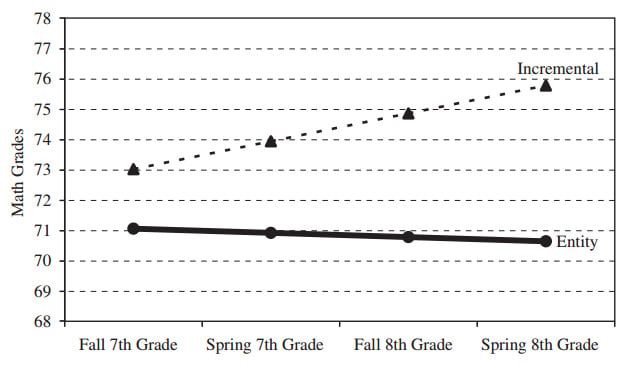
Imagine how this difference scales over 20 years of your life, from elementary school to college and eventually your career. The difference in the final result can be astounding.
This is why there's a recent movement for parents and teachers to stop calling kids smart. Adults think they're encouraging children with praise, but really they're promoting a fixed mindset. If you believe your success is due to intelligence and not hard work, then when you encounter failure, you'll blame your intelligence and not your lack of hard work.
Having a growth mindset is important because you will inevitably face challenges in your classwork. You will do much worse on a biology test than you expected. You'll get an essay back with a lot of red marks saying you just didn't get it.
It'll feel terrible. I'd know—despite my perfect grades, I was nowhere close to acing every single assignment and test.
But after you give yourself time to grieve, you need to analyze exactly what you did and figure out what went wrong. Your actions led to this subpar result, and you need to change your actions to improve your result.
This all starts with believing that you're capable of getting better. If you don't accept this, you'll just throw up your hands and resign yourself to your fate, which is basically like treating every class like a lottery. (Below, I'll talk more about how to use feedback to reflect on your study strategy and improve.)
The idea of a growth mindset is important throughout all of life, really. Whether you're learning how to ski or trying to build stronger friendships, the belief that you're capable of improving gives you the fuel to analyze your shortcomings objectively and actually try to improve them.
The alternative is to accept that you are now as good as you will ever be, and that whatever level you're at is how you'll stay for the rest of your life. That sounds pretty lame to me.

What Can You Do to Adopt a Growth Mindset?
If you said yes to any points in the pop quiz above, you're more likely to be operating in a fixed mindset. It's not likely you'll change this immediately since you've believed in a fixed mindset for many years.
Instead, you'll benefit from a mindset change and taking little steps in the right direction.
First, repeat after me:
- However good you are now, you can get better if you work hard and use your time effectively.
- Failures give you valuable feedback on how to improve. Failures are just temporary setbacks, and you'll do better in the future.
- You can learn to be good at anything because your abilities are almost entirely up to you.
Note that this isn't saying everyone can be an Albert Einstein or a Kobe Bryant. But you can get a lot closer than you think.
After you adopt a mindset change, the important steps are to apply the concepts to your work and continue believing in them. We'll spend a lot more time below explaining how to use feedback to improve your studying.
If you'd like to read more about the growth mindset, check out this article by Dweck or her book Mindset: The New Psychology of Success.
For some fun examples, here's a video of someone who learns to dance over a year with focused practice:
If a year seems like a lot of time, here's a video of a dude who learns to kickflip in a little more than five hours:
The same thing applies to coursework.
If you don't think you're naturally good at math, you can get better.
If you've never been a natural writer, you can learn to write effectively.
I'm dwelling on this point because it's so critical to breaking free from constraints that you place on yourself now. You can improve from where you are, and you can have a lifetime of growth.

#2: Be Prepared to Work Hard
We've already covered how top colleges consider coursework one of the most important pieces of college applications. These schools expect you to take a challenging course load with some of the hardest courses offered at your school (often AP or IB classes). You'll also have to do this while balancing extracurriculars, test prep, a social life, and your own sanity.
This means that your course load is going to be challenging, and your schedule will be demanding. It will take a serious amount of work to excel in every single class, and sometimes it will feel like you're just putting out new fires as fast as you can.
I probably spent at least an average of four hours a day on homework (including weekends) on projects and studying. This would increase dramatically when finals and AP exams came around.
There's no way around this. The smartest kid at your school might seem to just breeze through life and get straight As without breaking a sweat. (If she enjoys having this reputation, she might even actively foster it.)
The reality, however, is likely that this "perfect student" is busting her ass every day. She might just hide it well or doesn't really treat it like work, and so doesn't seem to be breaking a sweat. If you really enjoy learning, then working hard on schoolwork won't be nearly as painful.
If you're used to a comfortable life and schedule with many hours of free time every day, you'll probably have to start making tradeoffs in other areas of your life. If you care about highly competitive college admissions, you will need to orient your life toward that.
This usually means less personal relaxation or social time and cutting out an extracurricular that isn't adding to your application. (Again, I'm not saying you have to do this. Not every student should aim for top colleges and the most rigorous course load possible. But it's a meaningful goal and one that's important to a lot of you, so I'm just being real about what it takes.)
High school is of course four years, and so it's going to be a marathon.
It will take effective strategies to understand where to spend your limited time to get the maximum result.
It will take discipline to keep yourself focused when there are distractions everywhere.
It will take motivation to power through disappointments and setbacks.
But the rewards are worth it, and if you learn these skills, you'll be stronger in the rest of your life. We're going to talk about each of these aspects below.

#3: Find Something Deep to Drive You
For pretty much all ambitious students, high school coursework is going to be a grind. I'm not saying that learning isn't fun, but inevitably you'll have to do assignments you don't care about, sit in class listening to profoundly dull teachers, and prepare for exams that aren't fun. All of this is going to take time and mental energy to drive through the most painful parts.
Having motivation makes a big difference in how hard you work and how strongly you persist through difficulty.
It turns out that there are actually two types of motivation: extrinsic motivation (coming from outside) and intrinsic motivation (coming from within). One of them is a lot more durable than the other.
A common source of extrinsic motivation is parental pressure. If you fail a test, you're grounded. If you don't clean up your room, you have your phone taken away. More positively, if you get an A, maybe your parents buy you that pair of shoes you always wanted.
This can definitely work—but only in the short term and not reliably. While you might do your homework and stop texting for a night, ultimately it leads to frustration and resentment and won't be reliable for long periods of time.
Just remember the last time you argued with your parents about something they wanted you to do, like chores or homework. Fear of punishment can be an effective motivator, but it wears off, especially as you get older and more independent.
"Fine! Ground me, I don't care!" Sound familiar? If you rely on your parents to keep you motivated and your parents aren't around, you won't work.
In contrast, intrinsic motivation comes from within. It's something you want for yourself—screw what other people think.
You might have a dream college you want to attend.
You might want to prove your haters and doubters wrong.
You might want to compete with your nemesis and come out on top.
You might love learning things just because.
In the darkest of times, this motivation will drive you forward. When you're tired and would rather watch YouTube, the idea of getting a B will get you out of bed and keep you focused. When you get a C on your essay, the idea of failure will be unacceptable and you'll have no choice but to question where you fell short and how you can improve in the future.
Research shows that extrinsic motivation, such as rewards, are weak reinforcers in the short run and negative reinforcers in the long run.
Dig deep, find something internal you care about, and keep adding fuel to that fire.
I want to caution here that you should try to steer away from unhealthy motivations if possible. I was very competitive in high school to the point of being repugnant, and my high school atmosphere overall was pretty toxic. It's better if you can find something positive to encourage you that doesn't make you a jerk.
There's more on intrinsic vs extrinsic motivation here, written for teachers.

Up to this point, we've covered really high-level mindset and psychology. I know parts of this sound like hokey motivational speech, but trust me: way more students suffer from these problems than I would like.
Even though schools rarely cover these topics, I think they're the most critical of all. If you don't believe you have the capacity to improve, each failure will cripple you mentally. If you have nothing to drive you, your work every day will be painful. You need a super solid foundation on which to build your actual learning and study habits.
With this in mind, we'll talk about about the next level: good academic practices and habits.
Section 2: Overall Planning and Habits
In order to get a 4.0 GPA, you need more than just the right mindset—you need to cultivate effective study habits. This section goes over how to plan out your study schedule so that you're on track to getting a 4.0.
#1: Plan Out Your Specific Course Sequence Early
Let's start with the basics. You need to know early on what classes you're going to take your four years in high school. This will help prepare you mentally for what's to come. Once you make sure you have all the requirements in place, you'll be able to start gathering info on classes to come—and also be able to picture the story you're building for your college applications.
You can approach your course sequence in two ways:
- The first way is top down. How many AP classes do you want to have taken by the time you apply to college? Which ones? With this in mind, you can fill in the classes backward based on the requirements for each one.
- The other way is bottom up. What classes have you taken already? What's the logical, ambitious progression from this point forward? This will take you from now into senior year.
Gear your expected course sequence toward your interests. You don't have to take every single hard class available. Remember what Harvard's admissions office says: "[S]tudents should pursue the most demanding college-preparatory program available, consistent with each student's readiness for particular fields of study" (bold emphasis mine).
Roughly speaking, you tend to fit into one of the following categories:
- Math/science
- Social sciences
- Humanities
This is useful for colleges to understand what you lean toward. I was a science guy and made sure to take all the major AP sciences as well as Calc BC and Stats. I still took AP English, History, and Spanish, but I didn't take AP courses for economics, psychology, and others.
If you don't know what you're interested in, you can do a general spread of the usual courses. As I suggest in my guide to getting into Harvard, I recommend thinking about what you want your application story to be and deeply exploring specific interests rather than trying to be too well rounded. (Sorry to keep linking to my Harvard guide, but it contains my best admissions advice and resonates strongly with this guide!)
This also means that you don't have to play the same game as everyone else. You do not need to take exactly as many AP courses as the top student in your school does.
Are you a writer who really wants to showcase this talent in your college application? You don't have to take AP Biology. It might be really difficult and unenjoyable for you, and it will take up hundreds of hours that are far better spent elsewhere that will strengthen your application.
For my business, I interview and hire a lot of Ivy League graduates. When I ask about AP scores, it's actually rare for someone to have taken the full gamut of AP courses, or even close to the 14 AP tests that I took. Most often it's centered around their core interests.
Don't feel pressured to do what your friends are doing or what's generally accepted as right.
Finally, make sure you really understand all the prerequisites for each of the advanced courses and plan ahead. You might have to take summer-school courses—understand how this works and anticipate any issues.
A personal example: I wanted to take AP Biology my freshman year, which meant I had to take biology as a summer course after 8th grade. This was unusual and I was only one of two freshmen to do this.
The next year I wanted to take AP Chemistry as a sophomore, which required me to take chemistry in the summer. My high school only had two available classes for chemistry, and they prioritized older students. I didn't get the placement, which meant I had to register at a high school half an hour away and drive back and forth each day (thanks, Dad).

#2: Start Getting Early Info on Future Courses
Another benefit of planning early is that you can start gathering information on courses you'll be taking in future years. This will prepare you mentally for what's to come and let you structure your life accordingly, like having the right amount of extracurriculars so you can stay afloat.
Different schools have different reputations for how courses are run. At my school, AP Biology was seen as a hazing boot camp, requiring hardcore memorization of tiny details. In contrast, AP Physics was really laid-back, even though conceptually I think it's a lot more difficult.
This might be the opposite at other schools. Being able to predict this will help you prepare your life in advance and make sure you know what you're getting into.
Also, different teachers have different reputations. One AP Biology teacher at my school was known for being excellent—he explained concepts clearly, was enthusiastic, and showed students the bigger picture. The other teacher was unanimously considered one of the worst teachers at our school. I had the latter (fun story on this later).
Even though you might not have control over which teacher you get, you'll be able to gauge how much variation there will be in your future.
How do you start doing this?
- Get to know upperclassmen and talk to them about their experiences with classes. Everyone loves griping about school. If you have older siblings, ask them and their friends, or join a club through which you can meet upperclassmen.
- Talk to teachers in advance. Ask honest questions about how to prepare for their classes, what the weekly workload will look like, and how intense students feel the class is. Most teachers will actually appreciate this, as long as you don't keep neurotically bugging them about it.
If you set your expectations correctly for the future, you'll be prepared to weather the storm.

#3: Be Ruthlessly Efficient With Your Time
This is probably my most important piece of advice in this section.
There is one limitation in every human's life, from Bill Gates' and Mark Zuckerberg's to yours and mine. It's the time you have per day. Everyone has only 24 hours in a day, and it's up to you to get the most out of each day.
If you're aiming for a top college, building a strong application will likely take up almost all your free time. Roughly speaking, out of 24 hours in a weekday, you have eight hours for school and transit (which are mandatory), eight hours for life outside of school, and eight hours for sleep. (And I do recommend you get sleep—more on that later.)
Of the eight hours you have outside of school, you might need four hours every day to get through your homework and another two for your extracurriculars. This gives you just two hours of free time. Weekends remove the eight hours of schooling but likely replace it with more studying, test prep, and extracurriculars.
When charted like this, it's clear that you have a strictly limited amount of time every day to get through what you need to get through.
Therefore, every hour you can spend or use more efficiently is a huge gain.
Furthermore, if you're able to save an hour every day, you'll be able to get an extra 365 hours per year. This is a massive amount of time you can use to improve your grades or make serious progress on an extracurricular.
The most driven applicants you're competing with will be focused and productive 80% or above all the time. They'll be strongly motivated to do well and often passionate about what they're doing. (Remember what we discussed regarding intrinsic motivation.)
If you're productive at only half this—or 40% of the time—you'll lose out on 3,500 hours of productivity over three years of high school. This is a staggering amount.
We'll talk more about time management below, but there are two high-level points I'd like to make now.
Time Spent on Any Activity Usually Has "Diminishing Marginal Returns"
This means that for each unit of time you put in, the extra value you generate shrinks rapidly.
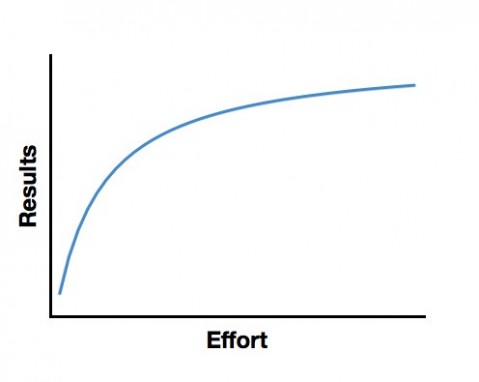
This is an economics concept that applies to a lot of everyday life.
Notice how at the very beginning, a little bit of effort makes a big impact on results. After a while, each additional unit of effort barely moves the needle on output. Thus "diminishing marginal returns."
A common time drain is social time or hanging out. If you haven't seen your friends all day, then the first 10 minutes you see them are going to be super exciting. You'll share the latest news and gossip and find out more about each other's lives.
By the end of the first hour, though, you'll often run out of things to talk about. This is where awkward silences might start settling in and people start focusing on their phones.
By the end of the third hour, you're probably in a zombie-like state in which you're hanging out but not really doing anything in particular. You could have packed things up two and a half hours ago and spent the rest of that time doing something more effective.
The same goes for texting, Snapchat, Netflix, and browsing the internet, as far as your happiness is concerned. The first little bit goes a long way, but the rest of the time doesn't add all that much.
The trap here is that all these activities are pretty pleasant and pain-free compared to running a marathon or studying. Like a warm blanket in winter, they're easy to get lost in and hard to escape from. It takes real discipline and willpower to break out of that trap and do hard things like study for a test.
Surprisingly, diminishing returns applies equally to classwork. There really is a point at which studying more isn't going to raise your score and you're just obsessing for no real reason. There's a point at which spending more time polishing an essay isn't going to get you a higher grade on it.
If you're a perfectionist like I was, you might obsess over every last detail. You have to recognize when good enough is good enough, and extra units of time aren't actually adding to the quality of your work.
Surprisingly, a 4.0 isn't about perfection in every single aspect of coursework. This is really stressful and difficult. It's about doing a good enough job everywhere and getting the most for the least.

Find Opportunities for Wasted Time and Spent It on More Useful Things
With the concept of diminishing returns above in mind, you should examine where you're spending your time and question the value you get out of every extra half hour you spend on it. This really extends to all aspects of your life.
Largely speaking, your life will be include school, homework, extracurriculars, test prep, social time, and family time. Some of these will be really important to your college application, while others won't be.
If a major goal of your high school life is to get into the best college you can, then you need to structure your life around maximizing your chance of success.
There are a couple of common time sinks that don't end up contributing to your college application as much as you think they do.
Time Sink #1: Time-consuming, ineffective extracurriculars. Typically, extracurriculars will take up the most time outside of coursework. Certain activities take up a ton of time but aren't very impressive to the top colleges if you're not performing at an elite level. I'd like to single out a few common ones:
- Playing an instrument and in an orchestra/marching band: A serious musician might practice one to two hours a day. Being in a marching band might add an hour per day on average. Over three years, this will add up to thousands of hours. If you are not a section leader of a well-known group or a national-level performer, this experience does not add significantly to your application. Sorry to be blunt. Imagine the many thousands of orchestras and marching bands in the country, all with concertmasters, drum majors, and section first chairs. If you are rank and file, you will not stand out, but you will spend a lot of time on not standing out.
- Volunteering: Some students think that 1,000 hours of volunteering service is a lot more impressive than 200 hours. It's not—especially if you're doing something straightforward like delivering hospital samples or serving front line at a soup kitchen. You can get "credit" for volunteering with just, say, an hour per week. Again, hundreds of thousands of students volunteer across the country—it's just not that special unless you make it special.
- Athletics: Sports practices and games are grueling and can take up to two hours on average per day. Plus, when you get home at the end of the day, you might be too tired to maintain your willpower and do your schoolwork efficiently. If you're not good enough to be recruited for your sport or earn meaningful distinctions at the state level or above, it's really not that impressive. Once again, imagine how many hundreds of thousands of varsity athletes there are across the country, and imagine how you fit into this crowd.
As you can see, the pattern is that it's easy to spend time on activities that are very common, very time-consuming, and very indistinguishable from what everyone else is doing.

Time Sink #2: Hard classes you don't need to take. As I mentioned above, you really don't need to take AP Biology if it's especially hard for you. It's easy to get caught up in what everyone else is doing, but you don't have to play the same game. If you drop AP Biology, you might be able to take two AP courses in other subjects you like more.
If you're participating in one of these activities, dropping it can free up hundreds of hours a year. This is a massive amount of time.
Here's what you can do with this bulk of free time:
- Get your grades up: If you historically find yourself short on time to do homework and test prep of the highest quality, you'll be able to devote more time to doing a better job in school.
- Pursue a deep interest and make notable achievements: This is more impressive to college admissions committees than typical activities and will benefit you personally as you explore developing passions.
- Spend that time doing things that truly make you happier: If you're really stressed out all the time, chances are you're spending time on something that's not making you happy or adding much to your college application. Dropping it will be a breath of fresh air.
A clear exception to the rule above is if you really enjoy your activity. If you really really like volleyball but only play at junior-varsity level, then keep on doing it. Happiness is important, and it's usually better to be happy and un-optimized than miserable and optimized.
In all other cases, it's just silly to do one of these activities at a mediocre level at the expense of schoolwork or other helpful things.
I know this analysis sounds pretty intense, but it's super important, and not enough students actually take a step back and evaluate why they're doing what they're doing.
It's also a really good life skill—you're never going to have more time in the day, and when you get into college and your career, getting the most out of each hour will put you ahead of most people.

So that you're not worried about becoming a robot, I admit that I'm nowhere near perfect 100% efficiency throughout my day. In high school, I spent time every day chatting online with friends and playing computer games. These were my ways of unwinding.
However, I rarely ever let this "wasted" time expand beyond an hour per day, often because I gave it to myself as a reward after finishing all my homework. (Remember diminishing marginal returns.) My parents also were pretty effective moderators of this, sometimes disconnecting our internet at night so I wouldn't stay up til 2 am chatting about stupid stuff.
Again, the most important piece of advice I have in this section is to analyze everything you're doing and decide whether it's worth it. If you spend your time correctly, like what I suggest in my guide on getting into Harvard, this will put you far ahead of most of your classmates.
#4: Know When Every Assignment Is Due and Plan, Plan, Plan
For a sane life, you need to know precisely when major tests and papers are due, and when every homework assignment is due.
You then need to plan ahead and budget enough time for each assignment. You need to notice when you're ahead or behind in your schedule for each of your classes and adjust your time so you can catch up.
This is essentially like having five parallel pipelines going on at any one time:

A Gantt chart, a common project management technique. More hardcore than you need, but used here for illustration.
If you know you need a full week to write a good essay, plan for this. Start a full week ahead of when it's due, and not any later.
If you know you need 15 hours to study for an AP Biology test, budget the time for that every day.
I suggest using Google Calendar or the iCloud Calendar for this. You can color code categories of work like homework, projects, and tests. You can also set alerts for things you tend to forget.
You want to be a machine and aim for full preparation for everything you're responsible for.
You should treat any surprises or last-minute work as a failure of planning. These increase your stress and lower the quality of your work. No last-minute homework crunch of quiz studying should be happening.
I know that all-nighters are, in rare cases, necessary, but they should not be a common occurrence. While it might be fun to bond with friends over pulling an all-nighter for a paper, take a step back and realize what that says: "I didn't plan well enough to budget enough time for this assignment, even though I've already done 20 of them. It was physically and mentally painful, and most likely lowered the quality of my work."
The better thing to do is to have that paper ready a whole day before it's due and have it so rock solid that you're sure it's going to get you an A.
Here are a few effective scheduling tips:
- Do a regular weekly and monthly review of your schedule to plan ahead: Get your parents involved since they can help enforce your planned schedule and deadlines.
- Prioritize your work correctly: Assignments that take up a bigger portion of a class's grade are more important. Classes that you're doing worse in need more critical attention. You should be dynamic and adjust to the circumstances. Do not just focus your attention on assignments you like more or that are easier for you.
- Know when to cut your losses for now and move on: It's easy to get stuck in a rut and spin your wheels without making progress. Move onto something else for now and come back to the assignment later. When you come back, you'll likely have a new perspective and get unstuck.
Again, since you're going to be spending at least 100 hours per month on homework, you might as well spend an hour a month guiding where that time will be spent.

#5: Don't Prioritize Other Things Over Sleep
Now, sleep. There seems to be an epidemic of high school students regularly sleeping very late at night—say, past midnight—and having to wake up at 7 am or earlier. They then need to get triple shot espressos every few hours to make it through the day.
This sounds crazy to me.
It's universally accepted that teens should be getting eight to 10 hours of sleep every night. When I was in high school, I regularly slept from 11 pm to 7 am, without fail.
I remember this clearly because in senior year, I had to stay up till 2 am working on a group English project that we'd all procrastinated on. This stood out to me because I'd rarely ever stayed up that late.
And yet, with eight hours of sleep every day, I was still able to pack everything in. (Remember what I said above about being ruthless with effectively using your time.)
Sleep has a huge impact on your performance and happiness.
Worse, it affects you in an insidious way—you'll think more slowly and less creatively. Essentially, a vicious cycle happens: you fall asleep later, making you less efficient and making your homework take longer to do.
If you're not getting enough sleep, you need to examine where you're spending your time and be sure that every hour you're spending on something is really worth it. I would bet something does exist that you can cut out.
There's probably some combination of an intense coursework schedule, a demanding school, and intense extracurriculars that make it extra hard to carve out more time. But I'm sure at least one of two things is happening:
- There's a lot of time spent on an activity that isn't actually worthwhile for college admissions or
- There's ample time being wasted somewhere else (we covered both above)
I can also guess that something dumb is happening: sleeping late is now considered a badge of honor, especially at uber-competitive high schools. If you're around hardworking students, people likely brag often about getting only four hours of sleep. Pounding Red Bulls visibly is something to be proud of. They might even be tempted to share this on Instagram, timed perfectly at 3 am.
 #allnighter
#allnighter
This is silly because it incentivizes the opposite of what you want—it rewards you for being inefficient, not efficient. In fact, people who do this probably waste time during the afternoon because they want to sleep late. Sounds crazy, doesn't it?
You should aim for the opposite—do really well and make it look easy. (If people don't actually do this, I apologize as I'm an old man now and out of touch with you teens.)
Here are tips to get more sleep:
- Enforce a sleep deadline every day, like 11 pm, so that you can get up by 7 am to get ready for school. Force yourself to lie in bed, not grab your phone and burrow under the covers. If you have to break this deadline, make sure you have a good reason for doing so.
- Cut caffeine six hours before your scheduled bedtime. After that point, drinking caffeine can have serious effects on the quality of your sleep. I see people in Starbucks at 9 pm and have no idea how they sleep at night. If you need caffeine to stay awake from 5 pm to 11 pm, you're probably not getting enough sleep at night!
- Cut the use of electronic screens on phones, tablets, and monitors before sleep. Blue light from screens disrupts your circadian rhythm by tricking your body into thinking it's daylight when it's not. You can also install software that changes the color of your screen to a warmer color. Flux is great for desktops and laptops, and Twilight for Android. iPhones offer a free Night Shift mode you can access through the Settings app.
- If you have a habit of wasting too much time before bed (like me), then strictly enforce your deadline again.

Up to this point, we've discussed high-level strategy. This sounds like general life advice, which is appropriate given that since you're a student, school is a major part of your life.
If you want to get a 4.0 GPA, you'll need to master your life habits and psychology.
I can't repeat enough that you need a solid foundation on top of which to build your studying and classwork. If you don't have this, you'll end up like those unfortunate students who take on heavy course loads and flounder for years, getting five hours of sleep a night, feeling miserable, and not making it into their target schools.
This is a recipe for academic discontent and disillusionment. It's like trying to build a house on quicksand.
Instead, you want to build a fortress on bedrock. After reading this guide, take the time to review all the important notes and reflect on whether you feel like you're executing them well. You might even do this every semester to make sure you're on track to your 4.0.
Section 3: General Class Strategy
With the high-level stuff covered, we'll now get into the thick of it: how to get straight As in your actual classes. This section will cover general class strategies that apply to every single class you take, regardless of subject. Section 4 will then cover strategies for individual subjects like math and English.

#1: Understand How the Class Is Graded
At the beginning of the year, every teacher makes clear how the class will be graded. This varies tremendously from subject to subject and teacher to teacher, and it's important to understand where you should be spending your time to get the best results.
There are two important pieces to this:
How Are Different Components of Your Work Weighted in Your Final Grade?
Commonly, this means a distribution across homework and projects, test scores, and participation. Different teachers have different weightings. Often, science and math classes focus on tests, while English classes focus on essays and projects.
You need to prepare a strategy for each course to do well on whatever is maximized. A simple rule of thumb is that you should spend a proportional amount of time depending on how much it contributes to your grade.
If a class is 50% tests, 40% homework, and 10% participation, you should split your time for that class accordingly. In this case, you could get away with minimal class participation as long as you ace the tests and homework.
Sometimes this can be deceiving—some teachers might give little weight to homework and more to tests, for example (this is almost always the case in college courses).
But it's often difficult to do well on tests without the regular commitment to homework, so you should spend that time on homework even if it doesn't contribute to your grade.
What's the Grading Scale—Is It Curved? Or Is It Based on an Absolute Scale on Test Scores?
Curved scales are rare in high schools, likely because they lead to unwanted competition. But if your class is curved, you need to pay attention to where you're positioned in the class, rank-wise, and you need to give yourself extra wiggle room in case the curve on a test is particularly tough.
If, instead, the class is graded on an absolute scale, like 93%+ is an A and the tests aren't curved, you can focus more on your own performance. This also makes planning more predictable—if you're at an 87% and need to pull yourself up to a 93%, you can figure out what your remaining homework and test scores have to be to get an A.

#2: Learn How to Learn
Learning is a mysterious process. You probably don't remember how you learned to walk or talk. When you memorize something, you can recall that fact some time later, even though you don't really know what is actually happening in your brain.
Even at the frontier of research, the nature of how we learn is still pretty mysterious.
Regardless, there are still a couple of principles of learning that have been provably effective.
Imagine Your Knowledge as a Tree
To build a tree, first you need strong roots and a trunk—these are the foundational concepts of the subject. Then, you build the branches and the leaves—these are the smaller details you're often tested on.
If you don't have a trunk, you won't have anything for your branches to grow on. So when you learn something, really focus on the fundamental core of what you're learning—the core that underlies all the little details. (I got this analogy from Elon Musk, the well-known entrepreneur behind SpaceX and Tesla Motors.)
For an example from calculus, let's take the concept of derivatives. On a test, you'll often get a function and be asked to find the derivative of it. Different functions behave in different ways; the derivative of 2x2 is 4x, but the derivative of sin(x) is cos(x). These often require memorization, and the details are the leaves of the tree.
The trunk of the tree is the fundamental idea behind what a derivative is: when you take a derivative of a function, what you're doing is defining the rate of change along the function. At any particular point, the rate of change is equal to the slope of the line tangent to the function at that point.
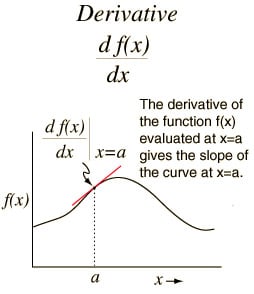
Derivatives, one of the most important concepts of calculus. If you're nowhere near taking calculus, don't worry about the details just yet.
When you understand this trunk, then every derivative formula afterward makes intuitive sense. You'll be able to absorb new formulas—new branches and leaves—much more easily since you just add them to the trunk.
But if you don't understand this trunk, you'll find yourself struggling to memorize the details piecemeal, as if you're making a shoddy quilt.
This is also true in the humanities. When you learn how to write an essay in English or history, look beyond just following the standard essay template given by your teacher. Here's what you need to understand:
- The thesis-evidence-conclusion structure is an effective way to make an argument because you prepare the reader for what you're going to say, prove it using evidence, and then recap the important takeaway points.
- When you cite textual evidence from a book, you need to relate it back to your thesis to make clear how the evidence supports or proves your point.
- Transitions between paragraphs and within paragraphs help the reader piece together all your disparate points into a cohesive whole.
Once you build this trunk, the details of how to do this with actual words and phrases will come naturally. If you don't build your trunk, you'll become frustrated with following someone else's instructions without knowing why.
When you learn something, really try to ask yourself what the root of what you're learning is. Once you identify this, the details will come more naturally to you. Many teachers don't teach this way, so it's up to you to do it yourself.
Constantly Relate New Things You're Learning to Things You Already Know
When I visualize how knowledge works, I imagine a network of nodes connected to each other. Each node is a unit of information—a math formula, a concept, or a historical fact.
When two nodes are connected, I see them as related to each other. Two linked nodes might be the area of a circle and the perimeter of a circle, for example.
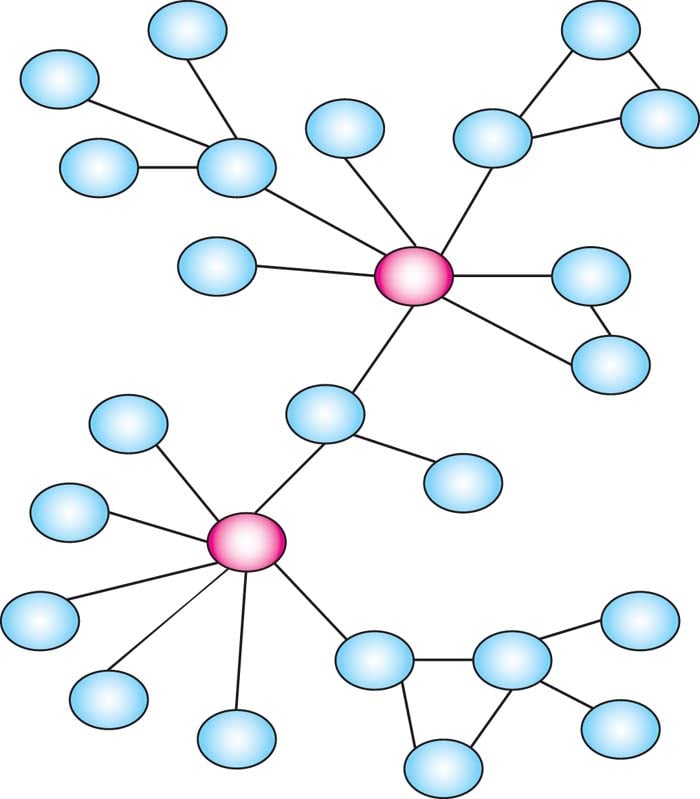
How I visualize my knowledge: each circle is a concept or fact, and lines connect related concepts.
Some nodes are heavily connected to each other. Some nodes hang on only by a thread.
Nodes that are weakly linked and not accessed often tend to be forgotten much more quickly. Intuitively, this makes sense: if a particular concept is related to other concepts, every time you recall one of the related concepts, you'll have a better chance of activating the related concepts. This then cements all the concepts around.
I know this is very abstract, so let's use an example. In US History, you'll learn about three core events: the Revolutionary War, the Civil War and slavery abolishment, and women's suffrage.
The brute-force way to learn about these events is to memorize the facts and details for each event, as though each were in its own independent vacuum. After all, you're likely taught and tested unit by unit, so this is the natural way to learn.
But in reality, there are key themes that tie these events together:
- Over time, the subjugated tend to earn their freedom: In the Revolutionary War, American colonists were under the dominion of the British government until they won their independence. In the Civil War, slavery was a contentious issue that eventually led to its abolition and the freedom of slaves. In regard to women's suffrage, women earned the right to vote equally as men. This trend continues to hold true today with gay marriage rights.
- For each event, key leaders spoke for the masses and represented their will: Select examples of these include the founding fathers for the Revolutionary War, Abraham Lincoln and Frederick Douglass for the Civil War, and Susan B. Anthony for women's suffrage.
- For each event, there was opposition that tried to maintain the status quo: This would be the British, the South, and society at large, respectively. (Both men and women opposed women's suffrage.)
I'm not a history buff so apologies for this complete simplification.
These unifying themes help you see the patterns among these important events. When you learn about Abraham Lincoln, you can relate his achievements to those of George Washington, strengthening your understanding of both.
Now, these events are clearly tremendously different from each other, but defining contrasts is just as helpful. During the Revolutionary War and the fight for women's suffrage, the main instigators were those being subjugated—the colonists and women. In contrast, in the Civil War, the action was more strongly led by white men in the Union and less so by the slaves themselves.
Defining these contrasts still develops a connection among the events, in turn leading to a stronger understanding of both. It also helps you ask interesting questions about why these events differed from each other.
You can see how altogether you're building this interconnected network of events. When you learn world history, you'll be able to fit the French Revolution, the Russian Revolution, the end of colonization, and other events into this framework.
This rich, multi-dimensional network-building is a stark contrast to the usual way history is taught—as a one-dimensional timeline. The one-dimensional way was how I was taught history and it made history a pretty boring collection of historical facts, which is a shame because learning could be so much more interesting and effective.
If you can focus on building a strong trunk of knowledge and connecting what you learn to what you already know, you'll be able to learn much more effectively.

#3: Understand How Teachers Think, and Give Them What They Want
If learning is your job, your teacher is your boss. Your responsibility is to follow the teacher's guidelines and give the teacher what she wants. Your performance will then determine whether you get a promotion (an A) or get fired (an F).
This can be intimidating, but it doesn't have to be. Even though teachers might seem like imposing vanguards of knowledge, in reality they're humans, with ambitions and flaws like everyone else.
By understanding how a teacher thinks, you'll be able to customize your approach to the class to increase your chances of performing well in it. This is especially important in subjective pieces such as essay grading, group projects, and class participation.
There's a huge variation in the types of teachers you'll have. Some teachers are veterans—they've seen it all and won't put up with your whining. Others are new—they're still trying to figure it out, really want to do a good job, and crave approval from students.
Some teachers are passionate, want to connect with students, and achieve carpe diem moments daily. Others are perfunctory and just want kids to keep quiet and cause less trouble in their lives so they can go home and watch The Walking Dead.
Some teachers want lively class discussions and want to see students inspire each other. Others run class like a prison—no outbursts, or you get solitary.
The more you understand how a teacher thinks, the more you can give the teacher what she wants. This might sound sociopathic and calculating, but in reality it's a social skill you already use without thinking much about it. It's also a skill you'll be using throughout your life, from college applications to job applications and work.
Here are some general principles I've found to be true of most teachers.

Most Teachers Do, at Their Core, Care a Lot About Their Job
They chose education as their craft for a reason, usually because they like the idea of inspiring students and contributing to their growth.
They also care about the subject matter—if they teach math, they find math interesting. If they teach history, they find history interesting. Grizzled veteran teachers might be disillusioned by this because maybe their kids have historically sucked, but they're still open to being surprised and inspired by the young people they teach.
What does this suggest?
Most teachers hate students whose sole concern is getting a good grade and who make this desire clear from their questions and behavior.
Most teachers love students who sincerely care about the class material and show curiosity. They love passing on their subject matter knowledge to students, filling the jar of the student's mind.
One place this is clear is in the syllabi that teachers write for classes. You might not know that AP courses at every high school are audited by the College Board for curricular soundness, and teachers are required to submit their syllabi for approval. Here's a real example from a teacher for AP English Language:
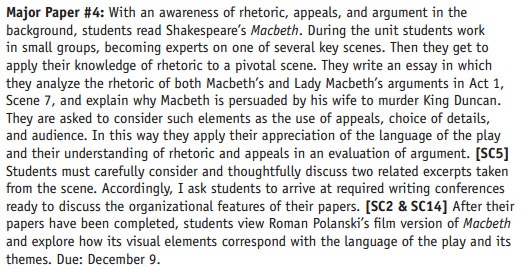
This lesson plan is an X-ray into the thinking of the teacher; it clearly describes the meaningful skills students are expected to learn, and the teacher's enthusiasm is palpable. While this is probably an example of an above-average teacher, it illustrates how teachers who care really do understand what they're teaching and what they want students to get out of it.
If you can prove to the teacher you're learning what she wants you to learn, you'll be in amazing shape.
Most Teachers See the Students They Teach as the Future Generation of Society
You are the future, so teachers want to see admirable qualities in their students. You'll be liked if you're honest, take responsibility for your mistakes, contribute positively to the class, and work hard. You'll be disliked if you're sneaky or dishonest, disrupt the classroom, act arrogantly, or blame others for your mistakes.
Be the kind of person teachers would like to entrust the future to.

Most Teachers Already Have a Lot of Work to Do
Teaching requires a huge time commitment. After school ends, teachers have to grade homework at night and plan for the next school day. Some of them supervise extracurriculars. This can mean an effective workday of 7 am to 6 pm.
If you cause more trouble and add to the teacher's load, this will be annoying.
If, instead, you can offer ways to lighten the teacher's load and solve his problems, he'll love you.
Why does all of this actually matter?
Understanding how the teacher thinks is critical to getting good grades on assignments, tests, and participation. On a history test, does the teacher care more about the big picture or about reciting minute historical facts? In an English essay, does the teacher care about executing a standard template well, or about having a novel point of view? What skills and concepts does the teacher really want to see in this essay?
If you approach your classes from the teacher's perspective, you'll be able to customize your work to what the teacher expects. We'll talk more about this later.
Another significant way this will improve your class performance is to communicate with the teacher more reliably. Given the same issue, you can present it in a way that'll make the teacher hate you, or in a different way that'll make the teacher admire your maturity and resolve.
Let's say you didn't do well on a test. An annoying student would say something like this:
"Ms. Robinson, I got a B on this test. I studied really hard and some of the questions were unfair. You didn't tell us they were going to be on the test. Also, I've been really busy with orchestra and volunteering—other students don't have these responsibilities. Is there any way I can get my test regraded? Can I get extra credit?"
Gag. This is nails on a chalkboard for a teacher. You get anti-brownie points. Poop points. I've overheard this often during high school and even in college.
Here's a better way to approach your teacher:
"I got a B on this test, even though I spent a lot of time studying, and I wanted to see if you could help. I'm not here to ask for more points; I just want to improve for the future.
I feel like I have a problem with the way I'm studying. For example, before the test I felt really confident with this kind of question, but on the test I made this mistake and I'm not sure why. Also, I tried to be thorough in my studying, but I missed the sections that were tested in these questions.
Do you have any suggestions?"
Let's contrast the two options. In the first one, you blame the teacher and your schedule, not yourself. You put the focus on the grade rather than the learning. Finally, you try to get an unfair advantage over other students without contributing anything yourself. This type of response is pretty typical because, to be fair, your goals are really important to you and it's tempting to try to get easy points where you can. (Also, you're young and more likely to think the world revolves around you.)
The second option is a 180 on the first. You put the emphasis on improving yourself, not on the grade. You own up to your mistakes rather than blaming other people. Before the meeting, you've done your homework by reflecting on where you might have fallen short rather than expecting the teacher to fix all your problems while you sit back. You also make it an open conversation in which the teacher can use her expertise to ask questions and dig more deeply.
These kinds of interactions make a world of difference in how teachers perceive you. It's unlikely teachers will actually give you an unfair advantage in grading, but it will make your life easier. You'll be treated with more respect and understanding. Teachers will work harder to help you. In cases wherein you need more flexibility, the teacher might be more likely to accommodate you. It'll also ultimately lead to strong letters of recommendation for your college applications.
Now, I'm not talking about sycophantic brown-nosing. You should be sincere and not just act the part. Teachers have seen a lot, and it's easier than you think to detect insincerity. One common way to sniff out a fake is to ask more questions and dig a little more deeply. If you haven't actually analyzed your test, for example, when the teacher asks you how you studied and what you think your mistakes were, you'll come up short. It'll then be clear you're just mouthing words, and the teacher will lose trust in you.
Take some time to think through classes you're struggling in or teachers you don't get along with. Do you understand what the teacher's expectations are? Why aren't you meeting them, and what can you do to improve this?
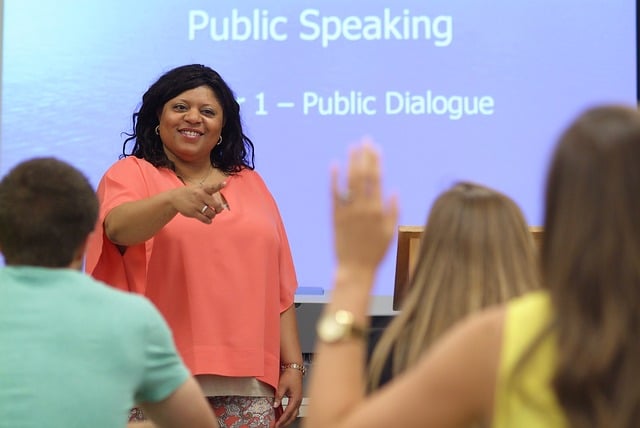
#4: Develop Strong Study and Homework Habits
Over the course of high school, you'll likely spend more than 3,000 hours on schoolwork and studying.
This is a lot of time. If you can make a 10% improvement on this by spending 20 hours learning really good study strategy, it'll be well worth your time. (This is what's known as "high leverage"—you put in a little to get a lot.)
Here are a few guidelines I think every student should follow.
Study Habit 1: Focus on Effectiveness and Efficiency
When you get into the thick of high school, you start taking a lot of things for granted. Each math homework assignment will take about an hour. Studying for a history test might take eight hours. An essay all included might take 15 hours.
Rather than taking things for granted, you should be continuously evaluating whether you're spending the right amount of time on your work. How long is homework taking? Why?
What is your time distribution across all the activities that go into doing homework? Is anything less effective than you thought it was? Can you experiment with restructuring your time so that you get better results for less time? (This connects to the "being ruthless with your time spent" point above).
As an extreme question, can you cut your total time down by 50% while maintaining the same level of quality? Why or why not? I ask my employees this all the time, and while it's not usually strictly possible, it helps illuminate what things can be cut with little effect on the outcome.
By going through this analysis, you'll be able to partition your time spent into effective and ineffective components. If you can axe the ineffective parts, you'll save a lot of time without affecting the quality of your work.
At the end of this reflection, you might find that there's really nothing better you can do and you just need to keep chugging along. This can be true, but you have to be honest with yourself and give yourself enough time to give this serious consideration. You should also experiment with alternatives or improvements and reflect on whether you've improved or declined.
Remember, there's always a time-quality tradeoff curve. Get the most for the least. Avoid perfectionism. Understand how much you need to do to get a great score, and when each unit of time is no longer returning you sufficient results, spend that time elsewhere.
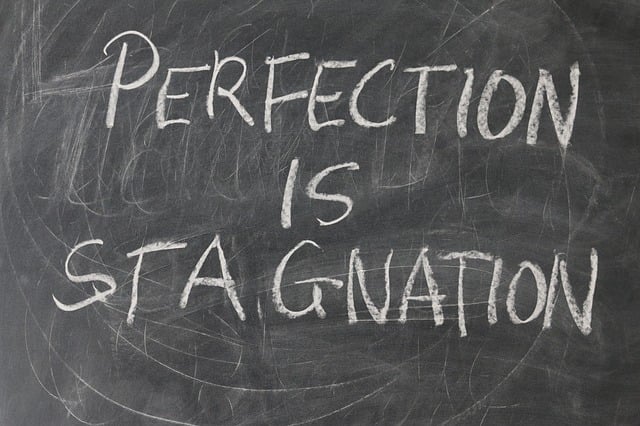
Study Habit 2: Put Away Your Phone, Turn Off Your Computer, Eliminate Distractions
There's homework time and there's relaxation time. Clearly compartmentalize both. Do not mix the two.
When you're doing homework, do it at 100% effort.
You're nowhere near as good at multitasking as you think you are. Focus on one thing, and then focus on another.
Recently, I went to a coffee shop and watched a college student at the table next to me try to study chemistry while using her phone. It was painful to watch: she'd read a page for two minutes, get a text, respond to it, and then browse Facebook for five minutes. Overall, it took her an hour to get through three pages.
She likely wasn't super motivated to study to begin with (hence why I started this guide with that high-level principle), but the bad study habits guarantee she's wasting her time. Not only was she getting nowhere with her studying, but she also probably wasn't enjoying texting and browsing Facebook all that much either. A lose-lose.
If you really have a problem with this, I suggest timing yourself just to see how much time you're wasting. Get a chess clock and force yourself to time yourself when you're studying and when you're using your phone.
If you need to use the computer while you work, there are browser tools such as RescueTime that track what websites you've visited and for how long. You can see how much time you're spending researching and how much time you're spending just watching YouTube.
You can also block distracting websites for a certain period of time. This way you can ensure that 6-8 pm will stay English-essay work time—not 20% English essay/80% YouTube time.

Study Habit 3: Do Homework in School If Possible
A lot of teachers have spare class time or downtime. Typically students just chat with each other until the bell rings. Use that time to do your homework you would otherwise do at night.
I remember AP Computer Science was an easy class. I'd finish assignments within 10 minutes and then work on homework the rest of the hour. In another history class, the teacher's lectures were unhelpful and I was better off just reading the chapter by myself at home. I took that time to work on other homework. (Note that some teachers get really annoyed when you do this, so be careful.)
There's also lunchtime, which is a little less than an hour. Many students sit at the lunch tables and chat until the bell rings. I banded together with a bunch of other nerd friends in the library and just did homework. Social life + homework = killing two birds with one stone.
Every day, this saved me more than two hours of time. When I got home, I'd only have a few hours of homework and studying left, which freed up room for extracurriculars and a few games of Starcraft. (This is also partly why I was able to go to sleep before 11 pm every night, even with my extracurriculars.)
Now, this isn't the coolest thing to do and you might be afraid of looking like a nerd. But if you think it's a good idea, you generally shouldn't lead your life based on what other people think about you anyway.
Study Habit 4: Learn to Deal With Procrastination
Procrastination affects pretty much everyone in multiple aspects of life. Everyone knows that feeling of how much easier it is to put off studying for a test so that you can get an extra half hour to watch Netflix. Before you know it, though, it's time to sleep and you haven't done anything.
We have an excellent guide on why procrastination happens and how to overcome it, in the context of test prep. I highly recommend reading it.
As a summary, procrastination happens when (1) you feel you're in the wrong mood to finish a task, and (2) you assume your mood will change in the near future. This can lead to a vicious cycle wherein you feel guilty for procrastinating, making it even harder to summon the energy to be productive again.

#5: Learn to Ace Tests by Understanding What's Being Tested and How
Tests typically make up the majority of how you're graded in a class. Teachers need a way to assess your knowledge in a standardized way that's hard to cheat on, and tests are the best way (or the least bad way) to do this. Learning how to prepare for tests and how to get great scores reliably is critical to getting straight As.
The most important piece to this is understanding what's being tested (the "content") and how it'll be tested (the "format"—e.g., multiple choice, essay, open-ended questions, etc.). This will directly determine what you study and how you prepare for the test.
You likely already know this intuitively—how you study for a math test is pretty different from how you study for a Spanish test. For math, you run through a lot of practice problems. For Spanish, you memorize vocab and practice grammar rules.
Once you know what you're being tested on and how, you can build your test-study strategy:
Step 1: Understand the test content and format
Step 2: Define your test-prep strategy, integrating reading, practice questions, and review
Step 3: Execute your study strategy
Step 4: Test yourself
Step 5: Improve your method and go back to Step 3
The critical piece here is Step 1: understanding what's actually on the test.
Even within the same subject, different teachers have different styles. You and your friend might be taking the same course—say, AP US History—with different teachers but have entirely different tests. Your teacher might emphasize fact memorization and have mainly multiple-choice questions gridded in through scantrons, whereas your friend's teacher might emphasize big-picture concepts and use tests consisting mainly of essays and free responses. The way you prepare for each test is thus very different.
How do you figure out the best way for you to study? Here are four helpful strategies:
Strategy 1: Ask Your Teacher for a Sample Exam From Last Year
Teachers are usually consistent in how they test from year to year, so chances are this year's tests will look a lot like last year's. In college it's common for professors to give access to previous years' exams as practice tests. Good high school teachers will do this because they don't recycle tests and want to give students fair exposure to what the test will be like.
On the other hand, bad teachers will hide previous years' tests because they are lazy, want to recycle the tests, and don't want to give resourceful students an unfair advantage.
Strategy 2: Get Exams From Last Year's Students
If you have friends or know upperclassmen who took the class with that teacher, ask if they've saved their tests. You can set up an exchange among your friends wherein you share materials from classes that others will take in the future. Lazy teachers really hate this because it forces them to write new exams each year, but that's part of their job.
Note that you should of course be careful and avoid allegations of cheating. If you're worried about this, feel free to ask your teacher how he feels about it before you try to get previous year's tests. And, of course, don't do anything dumb like plagiarizing someone's essay.
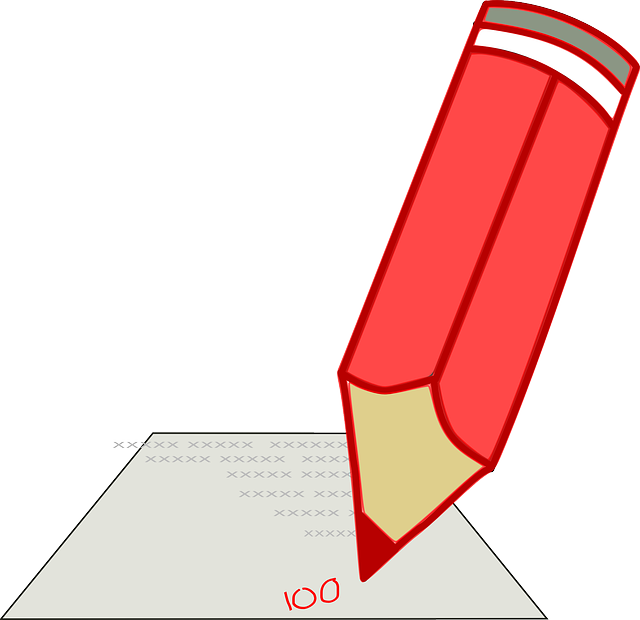
Strategy 3: Ask Your Teacher What's Going to Be on the Test and How It'll Be Tested
Don't be annoying about this. Remember what I said about giving teachers what they want. Teachers often hate the question, "Is this going to be on the test?" because they can't win. If they say no, students stop paying attention. If they say yes, students won't appreciate the greater meaning of what they're learning. Most teachers really do care about how their students are learning and get excited when they see students with a genuine love of learning.
A more palatable way of doing this is to be proactive. Prepare a high-level overview of content that you believe is on the test, and the format in which it'll be tested. Go to the teacher and ask her to take a quick look. Make it clear that you're asking because you care about doing well on the test and you want to understand the teacher's expectations.
You might even offer to save the teacher time by circulating this to your classmates so that she won't have to talk to 20 different students about what's on the test. (Remember, if you can make the teacher's life easier, she'll love it.)
If you do this earnestly and not in an obviously groveling way, the teacher will typically be more than happy to help because it's clear you care about your education.
Strategy 4: Use Every Previous Test to Infer What Future Tests Will Look Like
Even if you have zero information about the first test and you go in blind, the second test will likely look a lot like the first one. Halfway through the course, you'll be comfortable with how the teacher thinks and be able to predict the tests with high accuracy.
Story Time: My Least Favorite High School Class
The worst class I've ever taken was AP Biology my freshman year of high school. The teacher was a middle-aged man who was profoundly uninspiring.
Every day he'd turn off the lights, sit in front of the class with an overhead projector, and go line by line through the teacher notes provided by the book (Campbell's Biology). He would literally just read each bullet point, add a sentence or two, and move on. He had a monotone voice, and half the students treated this class as nap time (though as I suggest above, the smarter thing would've been to work on other homework during this time). Thinking about his inefficacy as a teacher is infuriating to this day.
The worst part of the class was how the tests were created. They were entirely multiple choice and often tested trivia straight from the book. There wasn't really any high-level thinking involved—the only way to do well on them was to memorize each chapter before the test.
I remember the worst question was a trivial fact from the caption of an image—I think it was the species name of a bird—that was totally irrelevant to what we needed to know for genuine understanding. He'd just decided it was a good way to test whether someone had memorized the chapter.
This struck fear into all of us. After bombing the first test, I had to change my approach. I started reading every chapter six times to memorize all the details. I'd highlight details like a madman to make sure I wasn't missing anything that might be tested. I'd create my own quizzes before reading the chapter so I could assess how well I was memorizing the details.
The key point is that I customized how I prepared to the content and the format of the test. My approach would have been totally inappropriate for another AP Biology class, but it was the right one for this class.
Going into the end of the school year, I had an A and was safe. It took a ton of work but I did it. Unfortunately, the teacher realized that because of how crappy of a job he'd done at teaching, the average grade in his class was going to be a C, and he was probably going to get a lot of hate from parents and the administration. He decided at the end of the year to administer a sample AP test that was entirely extra credit.
I was annoyed because I ended up with something like 130% in the class, which is why you see an A+ in my transcript for freshman-year AP Biology, which meant I'd studied unnecessarily hard.
The upside to this was that the actual AP test was super easy because I had literally memorized the entire textbook.

#6: View Your Job as Constant Improvement and Build Feedback Cycles for Yourself
NOTE: This is one of the most important points in this entire guide. I work with so many students who don't understand this and it's killing their potential to improve.
If something you're trying isn't giving you the results you want after a lot of trials, it's clear that you need to reexamine your strategy. If you're cutting broccoli for dinner and you chop off a piece of your finger every night, it's pretty obvious you need to change how you're using the knife (unless you love adding iron to your family's diet).
For some reason, this isn't as obvious in the context of coursework. If you get a C on a test, you might be tempted to believe that if you use the same study methods but just study twice as hard, you'll raise your grade to an A.
If the cause of your poor performance was truly a lack of time, then this can work. You can use my advice above to carve out more time for studying.
But in many cases, this is wishful thinking. It's as though you need to tunnel through a brick wall, and you're trying to get through by pounding your head against it. You're failing to make a dent, but you believe if you pound three times as hard you'll be able to get through it. There's something wrong with this strategy, and you need to understand why you've failed and how you can improve.
I think the reason this is so difficult in the context of coursework is that students don't understand the root cause of why they've failed. If you get a B on an essay, it seems tempting to think that you just need to spend more time researching and writing your essay, but really your weakness might be that you just don't understand the teacher's standards and are playing a totally different ball game.
This is why I stress the importance of the high-level concepts above. If you understand that academic success is a combination of multiple factors—motivation, time management, effective learning, understanding of class grading, teacher expectations, and the actual content—you'll be able to pinpoint your weaknesses more effectively.
If you don't understand these are important, you'll have no idea where to begin.
You should treat every evaluation as an opportunity for reflection and improvement. Remember the growth mindset we discussed above. Every disappointing homework assignment and test gives you a chance to reflect on how you failed and how you'll avoid these mistakes in the future.
We can call this the iteration cycle:
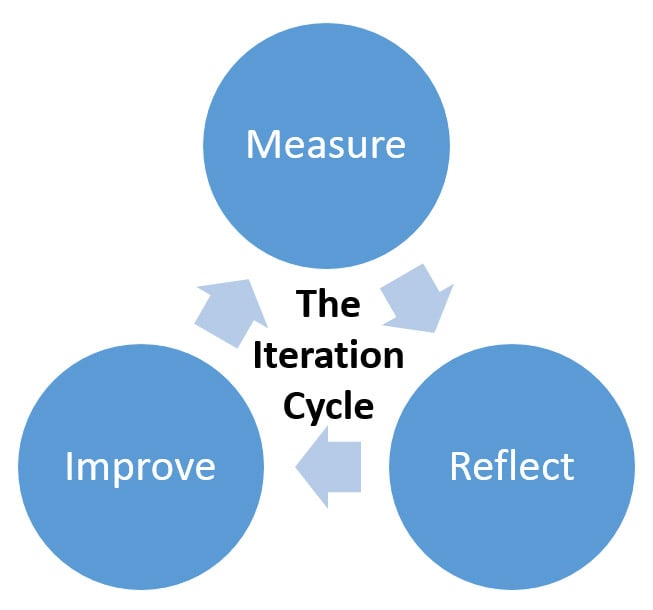
First, you obtain a measurement. This is often a grade on a homework assignment or test. If it's lower than your standards, something needs to change.
Next, you reflect on what happened. Here's a checklist of questions to ask yourself:
- How was the assignment or test graded? What did the teacher expect?
- What did you produce? What was your method of producing it? Try to break down the major pieces of what you did.
- What is the difference between the expectation and what you produced?
- Why did this discrepancy happen? What flaw in your method most strongly contributed to this failure?
- What are you going to change about your method to prevent it from happening again?
- When is the next time you'll be able to evaluate whether this is an improvement?
This is comprehensive and might sound tedious, but it's critical to improvement. In my experience with test prep, this is often the second-biggest barrier that prevents students from improving their test scores (the first is not putting in enough time, period).
Sometimes this analysis can be quick—you forgot to proofread your essay and your grammar mistakes got you points taken off. Clearly, next time you should dedicate time to spellchecking.
On the other extreme, after a lot of reflection you might not even know where to begin. Then you can ask the teacher for help. (Remember what I said above—if you go to the teacher with clear introspection and questions, this will show you really care about your education.)
Take notes on this reflection, especially on your plan for next time. Write this down as a commitment to yourself. The next time you have a chance for evaluation, such as a test or assignment, review these notes and implement your plan.
In the last stage of the cycle, you get your next measurement. If you improved substantially and met your goal, great work—from here on out, you just need to keep doing what you did. If you didn't improve or receded, treat your next iteration cycle even more seriously since your situation has gotten worse and you'll need to try something new to dig yourself out of the hole.
Do this for every class in every semester throughout high school. After you do it a few times it'll be second nature, and you'll do it without even thinking.
As an analogy, this is how you keep your car on the road when driving your car. You get constant visual feedback on where you are on the road. If you veer to the left, you reflect on this and turn the steering wheel to the right. You do this constantly to stay on the road.

When driving, you run constant iteration cycles to stay on the road.
When people first start learning to drive around age 14-15, they're not very accustomed to this feedback loop. They'll go nearly off the road before jerking the steering wheel back in the other direction. Then, they realize they've gone too far and jerk it too far back.
Practiced drivers make significantly smaller adjustments all the time. The next time your parents drive, watch them. You'll see them constantly make tiny adjustments left and right to stay exactly where they want to on the road. Experienced drivers do this automatically, by habit.
In your academic life, you don't want to drive 60 mph off the road. Use feedback to figure out where you are and what adjustments you need to make if you're off track.
As a side note, here's a video of teens getting distracted by their phones and shooting way off the road:
Complete failure to measure -> reflect -> improve.
I can't repeat this enough: this concept of iteration cycles is vital to your academic success.
Many students don't go through this process because they don't realize they need to or don't feel like it's important enough compared to actual studying.
In contrast, I would say this is the most important thing you should do after a test. Between every test you probably spend 20 hours in school and 20 hours on homework. Don't you think it's worth one hour examining your method and thinking about it if you're not doing well?
Don't drive 60 mph off the road.
Section 4: Subject-by-Subject Strategies
We've covered a lot of high-level stuff so far. We've talked about the foundations of motivation and determination. We've discussed figuring out how teachers think and how to understand how you'll be tested. We've also covered good study habits and how to iterate on feedback to improve your results.
Now, let's talk about specific subjects, because how you'll treat calculus is very different from how you'll treat history.
Math and Science Classes
Math and science classes are typically the most straightforward classes because the material is very standardized. If you take AP Chemistry, the tests will most likely look like standard chemistry questions, and the labs will look like standard labs. It's the same with calculus and physics—you have a ton of practice problems to work through in your textbook, online, and in supplementary books. Unlike English-essay grading, teachers can't really get too creative or subjective here.
The good news is that you can typically predict with great accuracy how you're doing well before a test. It's easy to prepare your own practice tests, review your mistakes, and understand where your weaknesses are and how you need to improve.
The hard part about math and science is that the concepts build on each other throughout the year. In short, something you learned earlier will directly affect your ability to grasp future concepts.
In physics, for example, if you don't understand how force diagrams work, you'll struggle every step of the way through mechanics. In chemistry, if you don't understand stoichiometry and how to convert units to each other, every calculation will be difficult for you.
This doesn't apply as strongly in other subjects like history, which tends to be composed more of modular units. Even though I mentioned above that you can connect different concepts to build a strong network of knowledge, at the end of the day they don't build on each other as much. You might have flunked the section on the American Revolution, but this doesn't strongly affect how well you'll do on the Civil War section.
Essentially, what you have is exponential growth of knowledge vs linear growth:
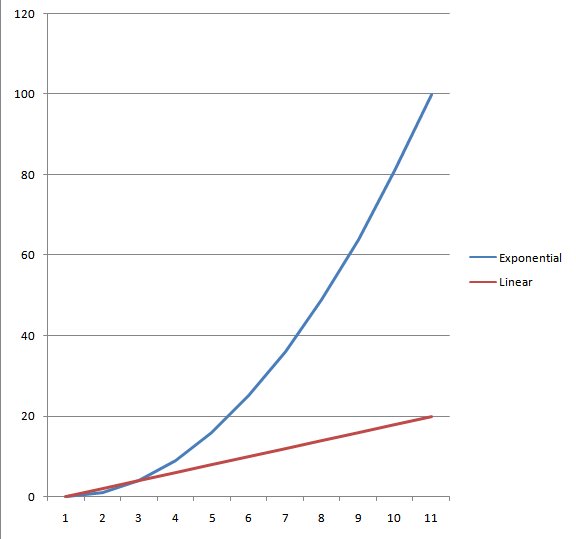
In my experience, math and science teachers don't emphasize this enough. They treat learning linearly, but in math and science it's really exponential. If you don't get it right in the beginning and don't fix it, you're screwed for the year because the teacher has already moved on.
So if you get a bad start to a math or science class, you need to double down and repair the holes immediately. If you don't, it'll only get worse. If you start a class way in over your head, consider dropping to a lower level.
Another issue with math and science is that the material tends to be dry since it involves a lot of abstract topics that don't really affect your everyday life. Good teachers will show you how the concepts apply to everyday life. If you're learning about EM waves in physics, for example, you'll also learn how your FM radio works. If you're learning about exponential functions, a teacher might take you through a simulation of compounded interest to show how much money you can make through savings.
I once heard a story about a physics teacher who was lecturing and tossed a ball at a student. The student caught it instinctively—didn't even have to think about it. The teacher said, "What your brain just did is a kinematics calculation. You knew exactly where the ball started, how it was traveling, and where it would end up. That's exactly the point of what we're learning—to mathematically predict how traveling objects will behave." I bet that teacher is awesome because that sounds a lot more interesting than just writing a formula on a whiteboard.
If you lack inspiration in math and science, try to relate what you're learning to the real world and to what you care about. If you're a news junkie, this will help you understand articles and analyses more deeply. If you're an athlete, think about how physics works in your sport. This won't always work and can sound a bit hokey, but sometimes you might be pleasantly surprised.
English and Writing Classes
In my experience the hardest part about English classes is the essay grading. Year by year, the standards you're graded on change, and the teacher's expectations change. Some teachers want you to follow the same formula essay after essay. Others want you to have a "voice" and write with style.
I had a frustrating experience in Honors English when we had to write essays about themes of books we were reading. Most people would write something like "the theme is abandonment." My teacher would draw a big red circle around this and write, "SO WHAT?" But she never explained articulately what she meant by this, even when we asked her.
Eventually, we figured out that the theme statement was supposed to be a concept that required a sentence to explain, not just a single word. This requires you to dig a level deeper, something like "abandonment is crippling to a child's psyche and ripples throughout adulthood." But she never explained it well, and it sometimes felt as if I were helpless at the hands of a merciless tyrant.
In English classes, you have to understand the expectations of your teacher and how he will be grading essays. As I said above, use every chance you have for reflection and iteration. If the teacher lets you submit drafts for review before the final essay, take this super seriously. Give the draft your best work, and if you're confused about any of the teacher's comments, ask about them outside of class.

If you don't do well on an essay, reflect on it, prepare notes, and approach the teacher and ask earnestly where your shortcomings are and how you can improve. (Measure -> Reflect -> Improve)
There are also solid foundations to effective writing, such as writing a clear thesis, using transitions between sections, employing textual evidence to support your points, and using appropriate and effective vocabulary. How to do this well is outside the scope of this article, but these are concepts you've been taught through much of English and can see every day in writing in publications such as The New York Times, The New Yorker, and The Atlantic.
Memorization-Heavy Classes, Like History and Foreign Languages
Some classes rely more heavily on factual recall than others do. In particular, I'm thinking about history classes, for which you need to memorize historical events and figures, and foreign-language classes, for which you need to build up a wide vocabulary.
Many students use flashcards for memorization, but they'll use them ineffectively. They'll just go through the entire stack from beginning to end and repeat.
This is ineffective because you end up spending the same amount of time reviewing words you already know as you do the words you have problems with. What you need to do is bias your time toward the cards you actually struggle with.
The way I do this is what I call the waterfall method of memorization. I describe this here in the context of memorizing vocab for the SAT. You cycle through the cards you don't know much more often than the cards you already know.
For long-term retention, there's also a concept known as spaced-repetition learning that spaces out your learning optimally to increase your recall of information. The idea is that right after you learn something, you should review it quickly thereafter to secure the memory. The next time you review, it can be spaced out further, and the next one even further still. Doing this regularly will lock in knowledge in the long term.
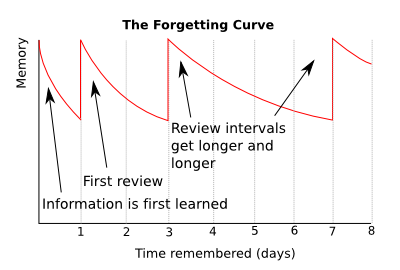
This is in contrast to the usual method of memorization, which is to cram before a test and then forget it until you need it for the final.
Anki is a good tool that does this for you automatically. Quizlet is another popular online flashcard tool where you can upload your own flashcards or use other people's flashcards.
As I mentioned above, try to find connections between things you're learning, and look for patterns. Connect historical events to each other. See foreign-language grammar rules as fitting a pattern, and notice when rules deviate from that pattern. This will make learning more interesting and help you understand concepts better.
Group Projects
This isn't a specific class, but it's a common enough issue that it's worth discussing. You'll inevitably have group projects, which means your fate is no longer 100% in your hands.
If you have a choice of partners, try to choose people who you know will do a good job. These are people who work hard and care about their grades. Friends might not be the best option if they're dead weight and you have to end up carrying them. Make it clear to the friend that it's not personal—you just don't feel you work well together. If the friend ends up dissolving your friendship because she expects you to lift her up, and it's not because you're being a jerk about it, then the friendship probably wasn't that strong to begin with.
If you don't get a choice of partners and the teacher just assigns you a group, you'll have to make do with what you have. Teachers are rarely sympathetic to complaints about your team, and it's unlikely you'll be able to change your partners. If anything, be flattered if you get paired with weaker students—the teacher might believe you'll be a positive influence on them.
Once your group is set, focus on getting a good job done. Treat it with the same care and planning as you would your own work, and don't be afraid to take charge if there hasn't been any action. Here are some tips for dealing with group projects:
- Write up the tasks that need to be done and split the work among group members. Ideally, you want to pair the tasks with people's natural skills and interests since this will maximize the overall quality of your project.
- Set up a timeline for milestones your group should hit. Make sure the group agrees on the plan and understands the details.
- Be prepared for timelines to be broken and think about what you'll do in those cases.
- Don't be afraid to take charge if there hasn't been any action.
Don't get hung up on inequality. There's sometimes that one dude who is a complete flake and never gets his job done, and you end up having to cover his ass. Don't sweat it. Focus on the big picture: your grade.
Redistribute his work to the rest of the team and revise the plan, and once again make sure the team agrees on the overall plan. Yes, the slacker might end up with a good grade riding on your backs, but he's also probably screwed for his individual assignments and for other classes. Karma works its way.
If there was anything really frustrating about the group project, you might tell the teacher. As I've said repeatedly above, the messaging to the teacher matters a lot. The teacher does not want to hear you whine about not getting a better grade because of your team. The teacher does not want to hear excuses.
The teacher does want to know of any potential problems and ways she can improve the classroom experience.
Here's an example of a bad way to talk to your teacher about a problem with your group project:
"It's unfair we got a B because of Taylor. She was supposed to do her part of the project but dropped out halfway through and we all paid for it. She should get a C and we should get an A. I didn't even want her on our team, but we didn't have a choice. Can I get a better grade?"
And here's a better way to approach your teacher:
"I wanted to let you know how our group project went since this might be helpful for our future projects. First off, I want to say that I'm not arguing for a better grade—as a group, we all share responsibility for how we did, and we deserve our grade.
So here's the story: when we started our project, we clearly divided up the work and everyone agreed on a timeline. Halfway through at our group meeting, though, Taylor said she was busy with tennis and promised to get more work done. We were all done with our parts and trusted her, which was a mistake. We ended up finding out two days before the project was due that she still hadn't done anything. We scrambled and tried to pitch in, but we were all busy so we didn't produce our best work.
I thought I'd share this story with you for future projects in case it's helpful. You should ask for her side of the story if you're interested."
This takes a totally different approach. First, you make clear that you're not arguing for a better grade upfront—this makes the teacher less suspicious of your motives, thereby encouraging her to listen to your story more intently.
Then, you present the facts, without emotional bias, and accept responsibility for your actions. You tell the teacher why this might be useful, and you exude enough maturity to suggest that you yourself might be biased so she should hear from Taylor's perspective, too.
In the worst case, the teacher ignores you. In the best case, the teacher might reconsider giving the team a bad grade if she finds out how negligent or manipulative the disappointing student was.

Don't Ignore the Easy Classes
In middle school, when I was a chubby kid, I got a B in PE.
Yep. I didn't know this was possible at the time, either.
It turns out the PE teacher gave everyone a set of physical exams—push-ups, sit-ups, stretches, and mile-run time—tallied up your points, and then gave you a grade. I did pretty poorly on all of them and ended up with a B.
You can see how many of my above rules I failed:
- I didn't have the motivation to do well since I didn't think I wouldn't get an A.
- I didn't understand early on how the class was actually going to be graded.
- Given chances for iteration cycles, I didn't reflect enough on my shortcomings and thus didn't change my method of preparing for the exams.
I freaked out and made sure I knew how PE would be graded in high school. I ran my little chubby butt off. In high school, they graded mainly on participation and attendance, so I ended up fine.
Don't let yourself miss an easy A. Understand how all of your classes are graded, even the ones that everyone thinks they'll get an A in. If you get on the bad side of your orchestra teacher, you might be surprised with your final grade.
Again, don't be a jerk about this by marching to the teacher and exclaiming, "I want to know how I can get an A in this class." Make it clear that you just want to meet the teacher's expectations and understand what exactly those are.

Bonus Section: 4 Pieces of Miscellaneous Advice
We've covered a lot already. Here are some last-minute pieces of advice, and then we'll wrap up with some summary points and a checklist for your academic health.
Tip 1: Get Some Objective Assistance
When you get as involved in something as coursework, it can be hard to take a step back and truly understand your shortcomings. An artist might not be the best critic of her own work.
If you have parents who care about your success and are willing to help out, send this guide to them and discuss it with them once they've read it. Talk about what parts you agree with and what skills you want to improve. Give them your goals and action plan for your high school career, each academic year, and each course. Inform them about your iteration cycles so that they can contribute new ideas about where you went wrong and how you can improve.
More importantly, don't get upset at them and accuse them of nagging when they try to help out according to the way you agreed. This just makes everyone miserable.
If your parents aren't interested in helping, find a friend who cares as much as you do about education and college, and hold each other to task. Even if you feel competitive with this friend in regard to getting into college, you'll likely lift each other to greater heights than where you would be individually.
Tip 2: Know the Trouble Signs and Act
High school can be stressful, especially if your goals are high. Not only are you preparing a strong college application, but you're also navigating the high school social scene, figuring out what you want to do in your life, and navigating your relationship with your parents. Sometimes all things come to a head, and it can be overwhelming.
Recognize trouble signs, reflect on whether they're serious problems, and act quickly if they are. Here are some important questions to ask yourself intermittently:
-
Are you deeply unhappy? Does every day feel like a slog to you and you're not sure why you're doing any of it? Think about the root cause of this feeling. Maybe your parents are pushing you toward a goal you don't identify with. Maybe there are conflicting aspects to your life—being better at school might mean getting ostracized socially, so you're caught in the middle. Try to reflect on this, identify any plausible root causes, and take steps to address them. (Easier said than done, I know, but you have to start somewhere.)
-
Are you getting seven to eight hours of sleep a night? If not, restructure your life so you get more output in less time. Chart out where your time goes every day and every week, and observe where there are possibilities for large improvements. This might mean cutting current activities and refocusing that time on something more helpful to your application.
-
Is one class dragging down the others? Are you spending a lot of time trying to stay afloat in one class, at the expense of your other grades? Consider dropping the course. The earlier you can detect this problem, the more easily you can avoid getting a permanent "Withdrawn" mark on your transcript. But even if it's too late to avoid this, dropping it is still preferable to failure across the board.
Finally, don't be too proud to ask for help. More people are willing to help you than you think—you just haven't asked yet. If you lack supportive parents or friends, seek help from your teachers and counselors. It might take some time and multiple tries to find someone to advocate for you, but one likely exists somewhere in your world.
If you suspect even a bit that you might have mental health concerns, seek help immediately. Again, more people are willing to help than you might think.

Tip 3: Prepare for Crunch Periods—Finals and APs
The end of each semester and academic year is typically pretty stressful. Instead of a staggered timeline, you'll get final exams in most classes all at once. Even worse, you might also have to prep separately for AP exams and the SAT/ACT.
The good news is that if you've built a strong foundation throughout the rest of the year, you're already 80% there before you study for finals. You might have forgotten some details, but the foundational tree trunks are still around. Preparing for the final is now simply a matter of loading the info into your short-term memory for recall.
If you're learning a lot of new material for a final, you're too late. Try the best you can, but next time focus on sustained effort throughout the school year.
As for AP Courses, usually getting an A in class will lead to a pretty easy 5, unless your class is really easy and A is the most common grade. Preparing for standardized tests uses the same skills and principles, no matter if it's an AP test or the SAT. I cover these principles in more detail in my guide on how to get a perfect SAT score.
Tip 4: Rinse and Repeat
High school is four years long (duh). Maintaining high performance throughout freshman to junior year requires sustained commitment, motivation, and high quality.
If you do really well on a semester, great job—take time to celebrate, but steel yourself to do it again the next semester.
The good thing is that the earlier you start building good habits, the easier it gets. If you start all of this by freshman year, senior year will be a breeze and you'll be well prepared for college.
The Grand Summary: How to Get a 4.0 GPA in High School
Notice how most of this guide has been about mindset, your personal psychology, and healthy habits. This forms an effective framework you can apply to every class and semester of school. Every important concept that got me a 4.0 GPA is written here.
Now, the hard work is actually adopting these practices and continuing to apply them through your entire high school career.
What's Next?
Looking for more tips for doing well in high school and beyond? Check out my other in-depth guides on how to get a perfect SAT/ACT score and how to get into Harvard and the Ivy League.
Prepping for the SAT or ACT? We've written the highest quality prep guides available anywhere. Browse our separate guides for each major test section:
These recommendations are based solely on our knowledge and experience. If you purchase an item through one of our links, PrepScholar may receive a commission.
Have friends who also need help with test prep? Share this article!

As co-founder and head of product design at PrepScholar, Allen has guided thousands of students to success in SAT/ACT prep and college admissions. He's committed to providing the highest quality resources to help you succeed. Allen graduated from Harvard University summa cum laude and earned two perfect scores on the SAT (1600 in 2004, and 2400 in 2014) and a perfect score on the ACT. You can also find Allen on his personal website, Shortform, or the Shortform blog.



































 Holly R.
Holly R.